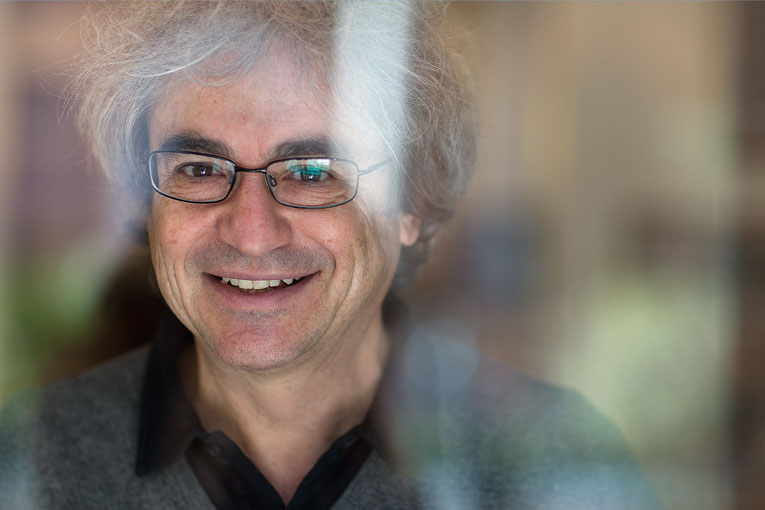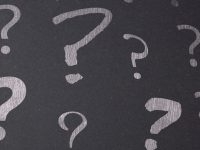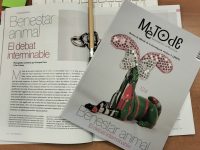Interview with Carlo Rovelli
«La ciència enriqueix la nostra manera d'entendre la realitat»
Professor de Física Teòrica de la Universitat Aix-Marsella

What is the link between Zeno’s paradoxes and loop quantum gravity? Carlo Rovelli, one of the leading figures in present day science, tells us the answer. This theoretical physicist, who leads a group at the Theoretical Physics Center of the University of Aix-Marseille specialised in quantum gravity, stands out because of his contributions to loop quantum gravity, a theory that seeks to mesh relativity and quantum physics, removing the contradictions between both of them. According to this theoretical proposal, space must be understood as a granular form. As a result, it would be impossible to divide it infinitely and, therefore, Achilles would not be doomed to rush into infinity trying to win the race.
His work as a science communicator is also highly recognised. Recently two of his books have been translated. One of them is Seven Brief Lessons of Physics (2016), a splendid and suggestive text, which became a huge bestseller in Italy. With just a few superficial brushes, professor Rovelli goes over twentieth-century physics and the problems that made it necessary to find a new theory. With a masterfully written book and demonstrating his true ability for synthesis, the physicist goes straight to the point and shows us the vision of the world behind each theory. He explains to us what his own concept of science is and shares with the readers what the ideal attitude of a scientist should be. The book is only a brief approach. If someone wants to dig deeper, then they can read Reality is not what it seems (2015), dense and longer, but equally well written, following the same criteria of no being exclusively directed to specialists. These are two twinned books – with some identical fragments – that show the reader the intellectual reasons that made this theoretical physicist dedicate his whole life to a theory still lacking empirical support.
Carlo Rovelli thinks that scientific ideas offer a vision of the world that helps us to understand it better. Furthermore, it makes reality even more interesting. Rovelli’s approach is a rebellion against the amount of physicists who hide behind maxims such as «shut up and calculate!» – an expression popularised by the physicist David Mermin – to laugh at everyone who wastes time thinking and reflecting about the reality behind theories rather than devoting themselves exclusively to resolve mathematical puzzles. Away from this hermetic and functional view of science, Rovelli explains that, rather than mathematics, science is a range of insights. For this reason, it makes sense that there is a book like his, dedicated to the exhibition of these ideas about reality, hammering under the theories. He also states that science is mostly about debate and reflection. The doubting process is what characterises the scientist above all.
I have the opportunity to interview Rovelli at the beginning of March, since he comes to Barcelona for a flying visit to launch the Catalan and Spanish versions of Seven brief lessons of physics. We meet at the Italian Institute of Barcelona.

I think it is wrong. Science has a utilitarian sense, of course, it is very useful and has changed our lives. But it is much, much more than this. Science is part of our general effort to understand the world, to make a picture of it. In fact, maybe this is one of the main points of the book [Seven brief lessons on physics].
It is also often considered isolated from culture.
I do not think that the separation between scientific knowledge and literary, philosophical knowledge is good. Now there is a separation and I think it is bad for both. And science all the time affects our global vision of the world. It is recent, this separation. I think scientists in the past paid more attention to what was happening in philosophy and history, and viceversa. Whoever was writing a novel in the past was aware. Shakespeare, Dostoyevski, etc. knew the science of their time.
Does that mean that we should be familiar with both the most important literary and artistic works and with the most fundamental scientific theories?
They are different, because the means are different, but the communication between the two is essential, I think. We should know about both. I am not an artist, but I listen to music, I look at figurative art, I read novels… I this they are essential for understanding the world. And so I think science is also essential for understanding the world.
Although science is usually expressed with mathematic formalisms based on reason, you insist in your book that there are a lot of emotions involved.
Yes. Whoever does science, I think. Science is more about passion, about getting involved with emotions. Of course, science is about using reason to check, not to be mislead by emotions. Reason is a tool, it is not the objective. Without reason we would be lost, we would say whatever. But what motivates us to do science, what pushes us to do science is… inspiring emotions.
On your book Seven brief lessons on physics you explain that the everyday approach to reality is colourless. Does science give it colour?
The world is much more complicated and rich than our everyday lives. Picture a stone. It is matter, it is the most boring thing of all. But a stone is a extremely rich object from the point of view of scientists. Atoms, molecules, quantum fields, material, it talks about the history of the planet. There is a world inside a stone, so science does not flatten our view of the world, it is the opposite. It shows all the possible levels and makes it more rich.
In a picture of Newton painted by William Blake, the scientist is naked, sitting on a stone and writing formulae. The artist made an effort to show that the stone is very rich, while the mathematical formulae are expressed in an extremely simple way. Blake seems to be saying that science does away with any nuance that makes reality interesting.
Indeed, and it is wrong. Mathematics is a language, it is like musicians: they write some dots on the paper, yes, but it makes sense later and it is fantastic music.

Confirmation is a characteristic of science. Wild ideas are possible, but then, the reason it is so powerful is that there is a filter [experimentation] that allows to discard the bad ideas and keep the good ones. I think this is the key tool that science has, what makes it different from anything else. Of course, also for writers of novels some things are good and some things are bad, but it is much more complicated to sort out what is valuable, because they do not have «hard proof». Scientists have proof. And sometimes this is also the tragedy of science, because sometimes there are some good ideas that are proven to be wrong. When I was a student, there was a very beautiful theory called SU(5). It made a very specific prediction about proton decay. So big machines were built to test this prediction, but the proton did not decay in the way it was predicted. So it was wrong, too bad. Nature does not always go where we would like to.
That would be the tragedy of science, the shadows of scientific activity.
Yes, but there is always the fantastic side of it, when an idea gets to be confirmed after all the work. When, after being predicted long ago, it turns out to be exactly so.
One of the central ideas in your book is the current contradiction between quantum physics and relativity. Is it possible to bring them together?
I do not think it is impossible to bring them together. I think it is hard and we have not yet succeeded. Scientists have discovered two main things in the twentieth century. General relativity has told us that the space itself can move. Quantum mechanics has explained to us that everything is discreet and quantum energy jumps around. Each of the two is ignoring the other. In quantum mechanics, we have a flat world, with quantum energy moving around; in relativity, the universe is moving continuously. So we try to bring together the two.

Very literally. Imagine space like little dots, like grains. The atoms of space. They cannot be cut in smaller units. These grains of space do not live inside a larger space, they are the space themselves. This is the intuition we are using to conform the mathematics formalism.
When applied to the universe, loop quantum gravity has surprising consequences.
Yes. These are the two domains where it can be applied. The application to the Big Bang seems to be saying that we can understand what happened before it occurred, and it seems to indicate that there was a contracting universe that at some point could not keep contracting (because of quantum phenomena intervention) and expanded. There are a lot of people studying that, also in Spain, and the hope is to check these quantum phenomena of the Big Bang in the observation of the cosmic radiation. I am now working with black holes, a star that collapses. But we do not know what happens in the center. We think that the matter falls in the center but the black hole could explode later, so we are trying to write calculations to describe this and to be able, in the near future, to see the signals of exploding black holes.
There is a lot of expectation regarding the recently discovered fast radio bursts. We do not know what they are or where they come from, but you suspect that they could be related to black hole explosions.
Yes, everybody is excited about the fast radio burst, but we do not know what they are. For the moment it is completely open, there are many ideas.
In your book, you state that reality is interaction. How does this idea modify our comprehension of reality? Should we conclude that there is no substance in reality?
Yes, that is what seems to me. It seems to me that science is going more and more towards linking the world in terms of interactions. It is more clear when you talk about complicated things. For instance, we understand animals better, because there is the gazelle and the lion is designed to hunt the gazelle. To understand ourselves better, we cannot see ourselves in terms of personal isolation. I have a «me» and a «social me». The same is true also for fundamental physics: elementary particles are better understood through the way they interact. The idea of substance, where we have a picture of the world that we can observe with ease, then think how it is affected, how it evolves, how it changes, is wrong. Forget substance, forget the substratum, forget matter, and just describe phenomena, interactions.
Should we stop thinking about matter as a scientific concept?
It is a primary scientific concept because it is useful, but it is not fundamental. If you think what physics says, the way physics describes matter, matter is just a way, a function, vibrating, something very different from what we thought.
You also defend that time is not a fundamental notion either.
There are many aspects of the world which are not fundamental, but are major for us. A good example is up and down. Things fall down, I cannot walk on the ceiling. But there is no up and down in the universe. I think for us time is essential and fundamental, it is important. But that is for us, because we are big, because we are not microscopic, because we live in a certain particular situation in the universe. There is heat, there is temperature, all these things. In our daily life nothing changes. But it is remarkable to learn about black holes and the Big Bang and these things that make us rethink time. We have to stop thinking that there is this unique time.
While you defend that time is not fundamental, Lee Smolin defend, another physicist that has contributed importantly to loop quantum gravity, suggests just the opposite, that time is one of the most fundamental notions. Your points of view are so different that they seem to describe different universes. And despite this fact, you support the same theory. How is this possible?
First, Lee Smolin is my best friend, we work together. It is remarkable that in science there can be very different ideas and at the same time work together and be friends. Nobody is sure, of course, so we discuss and talk. The theory is not complete, it is not final, it is not clear, so we are in the process of trying to understand what it means, to expand it. In this process, debating different ideas is essential. Science is about discussing things. It is not about willing to be right, is about willing to, maybe, change your mind. So discussion is a crucial part of science and the best moment in science is when there is a lot of discussion, a lot of debate. Then things clarify, then the dust settles, and things become clear.
Questioning fundamental concepts such as time and space sounds more like the work of philosophers than scientists.
It is a very similar process. When Newton explained universal gravity, he wrote in a letter that in his mind the idea that two bodies could attract one another with nothing in between was absurd. So he himself was debating his own ideas in his head.
It looks like philosophy is present in the scientific process.
It is. It has to be.

Of course we know more. It is fantastic, what they did. And there is a lot to learn from their ideas. It is not how stupid they were, but how intelligent they were. So we have to be able to do what they did, it is essential.
What is mathematics for you, a tool or something real?
I think it is a tool. Mathematics is the abstract study of structures, or possible structures. But I do not think it is more than that.
Can you explain what is your best idea?
My best idea… I do not know. I am always very involved with my last idea. I think a scientist has many ideas and discards many. Many things jump out and most immediately die, and some survive. They all come from confusion.
So confusion is the origin of creativity?
Oh, yes. If we do not go through confusion, we do not get these new ideas. The life of a scientist is a long frustration, because most of the time nothing works.
Can you imagine the day that machines will be able to do your work?
Not in a short time, not in our lifetime. In the distant future, I do not know. I think that machines are super-powerful, of course, but not like us, they are very different things. This idea that they can become like us, I do not see it yet. I do not think it is intrinsically impossible. But for the moment, I see that machines are super-intelligent for some things and super-stupid for so many others.
Roger Corcho. Journalist, Barcelona.
The deep understanding of the world

Rather than from mathematics, the author believes that science was born from intuitions to unveil a new way of seeing the world, just like those linked to the theory he defends. This means that physics ideas can be exposed without following the mathematical path, an abstract and highly specialized barrier that keeps a large part of the people away from the latest contributions in theoretical physics. Rovelli excels in explaining these insights: his speech, always brilliant and clear, shows an amazing ability to synthesise.
The book begins with an journey through some highlighted moments of the history of philosophical and scientific knowledge. This aims to identify the thoughts that can help to provide a better understanding of current physics ideas. This approach implicitly gets to show that the theory of loop quantum gravity is consistent with our intellectual traditions and gives answers to some issues raised. This journey culminates in relativity and quantum physics, two theories that, despite their achievements, are incompatible. This is the main problem that pushed Rovelli and many other physics to devote their lives to find a synthesis to end these contradictions.
Besides exposing loop quantum gravity in detail, the author analyses the consequences of this theory once it is applied to the universe. Physicists know that relativity gives infinite values to the initial state, a fact that indicates that the theory cannot keep working. On the other hand, loop quantum gravity theory says that, when quantum phenomena have been taken into account, the universe cannot become infinitely small. But the theory demonstrates that the universe was contracting before it expanded, that is, rather than a Big Bang, it would fit better talking about a rebound or a big bounce. The researchers are currently looking for evidence of these quantum phenomena in the cosmic microwave background. They are also sure that the study of black holes could provide some empirical evidence to back up the theory.
This book is many things at the same time: a reflection on the nature of space and time, an introduction to loop quantum gravity, and a brief overview of the thinking, with forays into the philosophy of science. One of the main lessons of this book, referred to in the tittle, is that science reveals a much deeper, richer and more beautiful understanding of the world than the one we can get in our everyday life. Above all, it teaches us that the scientific adventure that explores the theoretical physicist is usually quite risky: if loop quantum gravity remains without confirming its predictions (or contrasting), researchers will gradually abandon it, despite all the effort. Each scientific theory hangs in balance, between tragedy and glory. It has taken decades to erect this theoretical building and now possible ways of wording its experiments and observations are being considered. Either to make it collapse, or be seen as the only fundamental theory.
Roger Corcho. Journalist, Barcelona.
© Mètode 89, Spring 2016.





